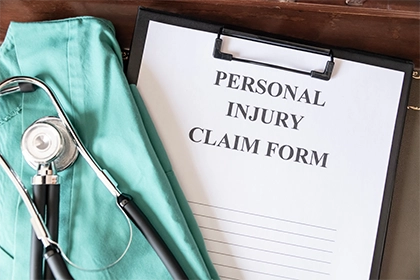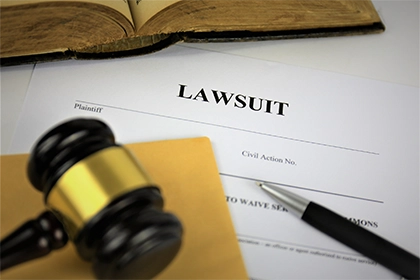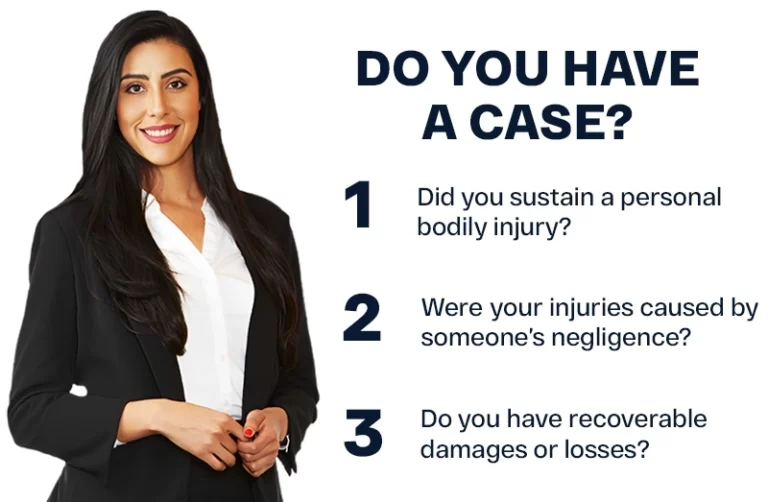Table of Contents
It can be daunting to deal with the aftermath of an accident that resulted in an injury. Sometimes, you feel like you’re being pulled in every direction and have no idea where to go. You may not only suffer physically and mentally, but you may also need to deal with staggering financial repercussions. In the midst of mounting bills, you may need to consider your options for pursuing compensation. This begs the question: what is the appropriate course of action? Is it better to file an injury claim or a lawsuit?
Injury Claim Vs. Lawsuit: Is There A Difference?
Someone outside of the practice of law may mistakenly use the terms “injury claim” and “lawsuit” interchangeably. However, they are different legal processes. Each has pros and cons that can make it more beneficial or detrimental in certain situations.
The primary difference between an injury claim and a lawsuit is their procedural settings and complexity. Here are a few distinctions between the two:
- An injury claim is a pre-litigation process where you negotiate directly with the at-fault party’s insurance company to settle outside of court. This process is often faster and less costly.
- On the other hand, a lawsuit is initiated when these negotiations fail or you can’t reach a fair settlement with the insurer. This process generally takes more time and resources to reach a resolution. It involves formal legal proceedings in court that include filing complaints, conducting discovery, and potentially a trial.
That said, a deeper understanding of the difference between the two can help you choose which option is appropriate after sustaining an injury. Below, we intend to distinguish between the two terms often mentioned in personal injury cases. We’ll discuss the definitions of both, their respective procedures, their pros and cons, why it’s important to file one, and whether you need to retain the legal knowledge of a lawyer instead of handling the case on your own.
What Is A Personal Injury Claim?
In the field of personal injury law, a claim is a formal demand for damages directed at the negligent party. It seeks compensation that may help cover the costs of the accident caused by the at-fault party, particularly the damages sustained by the victim. The claims process happens outside of court and can involve more than one party. Claims are usually filed against insurance companies.
During or after recovering from an unfortunate accident, people may choose to file a claim against the at-fault party’s insurance provider. A personal injury lawyer can provide legal assistance in this regard.
Common Types Of Personal Injury Claims
From traffic incidents and hit-and-runs to dog bites and workplace accidents, injury law encompasses a wide range of issues. Listed below are a few examples of personal injury claims:
- Car Accidents — Whenever someone sustains an injury resulting from a car accident that wasn’t their fault, they may seek compensation from the at-fault driver’s insurance provider.
- Slip-and-Fall Incidents — Someone who is injured in a slip and fall accident on private or public property may have grounds to seek damages from the premises owner.
- Premises Liability — Property owners are responsible for maintaining a safe environment for their guests and visitors. Any unsuspecting individuals who sustain injuries after legally entering a property that has unaddressed hazards can seek compensation through a premises liability claim.
- Product Liability — If you are injured while using a defective product, you may seek compensation for the damages you incurred. You can do so via a product liability claim against the item’s manufacturer. For example, you can file a product liability claim for birth injuries caused by defective medical tools or medicine.
- Wrongful Death — A wrongful death claim involves a victim’s untimely death caused by someone else’s negligence. If a pedestrian was killed, for instance, because of an accident at an unmarked construction site, their family may be entitled to monetary reparations.
When a claim is filed, the insurance company can send an adjuster, an attorney, or other experts to handle it. The adjuster will review the evidence and determine the appropriate compensation to offer the claimant based on their findings. The claimant, not the insurance company, decides whether to accept, reject, or negotiate a claim.
Experienced injury lawyers recommend seeking legal representation before accepting any offer so they can help you assess whether its terms are fair. A claim’s potential value may be higher than the insurer’s initial proposal. When you work with our car accident lawyers at Arash Law, we work diligently to pursue fair compensation for your injuries and losses.
Understanding The Claims Procedure
The claims process usually starts with a demand letter addressed to the at-fault party’s insurance company. In this letter, the injury lawyer will summarize the injuries and damages incurred by the victim and request a fair amount for compensation. Notably, the demand letter may or may not state the specific amount the injured party is pursuing.
After receiving the letter, the insurance company will respond with a letter of reservation of rights. At this point, they can deny the claim if it lacks merit or initiate the next step of the process: the negotiation stage.
The Negotiation Stage
Personal injury lawyers see the negotiation part of the claims procedure as a game of legal ping-pong. At this stage, both parties will start throwing trade offers and counteroffers until they either reach an agreement or tire each other out.
It is worth noting that the claimant can file a lawsuit at any time during the negotiation stage. That said, doing so will not necessarily end negotiations. Both parties may still try to reach a settlement until the jury’s verdict. Rather than dealing with many cases, the court encourages the disputing parties to settle.
Alternative Dispute Resolution
If conventional negotiations don’t work, the claims procedure can move toward Alternative Dispute Resolution (ADR). This stage refers to the different ways the two parties may resolve a dispute without going to trial. ADR proceedings tend to be less formal, more confidential, and less stressful than traditional court proceedings.
Here are some of the most common ADR processes:
- Mediation — The two parties agree to settle with the assistance of a third party.
- Arbitration — The disputing parties hire a private judge to resolve the dispute for them.
- Neutral Evaluation — A neutral expert on the matter predicts what the court will do to try to convince the parties to reach a settlement.
Generally, ADR is cheaper and faster than going to court to resolve a dispute.
The Settlement Agreement
Any lawyer for personal injury would advise you to refrain from agreeing to a proposed settlement through a handshake or exchange of words alone. You should obtain a professionally drafted settlement agreement before settling any claim.
Your injury lawyer should thoroughly review any agreement drafted by the other party for inconsistencies or loopholes before you sign it. Suppose that the liable party refuses to pay even after both sides have already signed the settlement agreement. The claimant can then sue them under contract law.
The settlement agreement stage is where most injury claims come to an end.
What Factors Affect The Outcome Of A Personal Injury Claim?
Numerous factors can affect a personal injury claim’s outcome, such as:
- Your injury attorney‘s ability to establish fault.
- Your situation’s complexity and elaborateness.
- The other party’s willingness to cooperate.
- The potential compensation you may be able to pursue.
Personal injury claims have some advantages over lawsuits, mainly because you don’t have to go to court. However, there are still many factors to consider before filing one.
What Is A Personal Injury Lawsuit?
A personal injury lawsuit is a civil action that an injured party files against a person or organization that caused their injuries. The ultimate goal of this action is to resolve a dispute between opposing parties. If a claim fails to yield a fair settlement, the next course of action is typically to file a personal injury lawsuit. In order to win, plaintiffs and their injury attorneys must prove that the defendant was responsible for the accident and injury.
Often, lawsuits last more than a year before they are resolved. The procedure for filing a lawsuit includes several steps, including discovery, motions, hearings, trials, and possible appeals. These processes can take a lot of time and money, and not everyone is willing to go through them. That is why having a competent personal injury attorney by your side is crucial whenever you intend to file a lawsuit.
How To File A Lawsuit
In order to file a lawsuit, the claimant must follow these steps:
- Inform the court clerk of your complaint in writing. There are consequences to every sentence in this document, so an experienced injury attorney should draft it.
- You must pay a filing fee to the court.
- Notify the defendant that a lawsuit has been filed. The claimant must follow precise procedures for serving the notice and cannot do so on their own.
There will usually be a formal answer from the defendant responding to the allegations in the complaint.
Pretrial Discovery
Pretrial discovery is a stage in legal actions wherein the parties involved may exchange information on the evidence that will be presented in court. Here are a few evidence-gathering tools used in pretrial discovery:
- Depositions — Statements made outside the courtroom by witnesses each side plans to call at trial.
- Demands for Production — The process of examining evidence in the opposing party’s possession. Document copies and physical evidence, such as a wrecked car, are included.
- Interrogatories — The other side answers written questions under oath.
- Requests for Admission — Both sides seek admission of facts that are often not disputed.
During the pretrial discovery stage, new information can give one side a big edge that can restart stalled negotiations or even force settlements in their favor.
Motions
Motions are filed with the court when parties want the judge to take formal action. Among the most common motions observed in a personal injury lawsuit are:
- Motion to Dismiss — It is a request typically submitted by the defendant for the court to dismiss the claim against them.
- Motion to Suppress — Filed by one party that asks the judge to exclude specific evidence (illegally obtained evidence, for example).
- Motion for a Change of Venue — This request asks the judge to move the trial to a different location.
During a lawsuit, a party may file dozens of motions to try to sway the case in their favor.
Trial
After all that, the trial can finally begin. The trial stage can last from several days to weeks for typical personal injury cases. In a trial, the parties argue their positions while questioning witnesses and presenting evidence. A judge or jury will then decide if the defendant is liable for the accident in question and for the losses sustained by the plaintiff. This also includes the amount of damages the defendant must pay.
Once the trial ends, either party is allowed to file an appeal. An appeal is a written request filed at the conclusion of a trial that asks another court (usually the Court of Appeals) to reassess or review the trial court’s decisions.
Depending on its nature, an appeal may take several months to several years to complete. Upon exhaustion of the appeal process, the losing defendant must pay the damages ordered at trial or on appeal.
What Factors Affect The Outcome Of A Personal Injury Lawsuit?
Like personal injury claims, several factors can influence how a lawsuit proceeds. In fact, there may be even more variables at play in lawsuits compared to claims.
For example, the judge presiding over the case and the people on the jury committee have much to do with the outcome of a lawsuit. Essentially, you are putting the amount of compensation you are seeking in the hands of strangers. While it seems risky, there is also the potential for a bigger payout this way, especially when you have a competent personal injury attorney by your side.
Even though it is recommended that you file a lawsuit only after your personal injury claim fails, you should know what to expect if you must.
Pros And Cons Of Claims Vs. Lawsuits
Below is a brief discussion of the pros and cons you should expect whenever you intend to pursue a claim or a lawsuit:
Personal Injury Claims
Resolving a claim without involving the court has numerous benefits. For one, it is more cost-efficient, as you won’t have to pay court fees and any extra costs. More importantly, if a claim is successful, claimants may be able to receive compensation faster.
The speed of a claim is primarily determined by your willingness to negotiate. If you are willing to accept a lower offer, then your claim may be resolved quickly. Meanwhile, if you want to push for higher compensation for the losses you suffer, prepare for several negotiations that can last weeks.
However, bear in mind that it also has disadvantages. These downsides include dealing with an insurance company that may review the specifics of your case closely to challenge the extent of their responsibility. As mentioned above, the insurance company is the one that decides how much remuneration they intend to provide. Seeing as they are a business at the end of the day, they may carefully investigate aspects of your case, including the recorded statements you make, the posts you share on social media, your medical records, and your claims history to contest liability.
There’s no such thing as a “guaranteed” settlement in personal injury cases, but filing a claim is a step you can take to seek fair compensation. While there is a possibility that the insurance company will outright reject your claim based on its merits, such instances are few and far between, especially if you have evidence to present. Additionally, remember that accepting a settlement may not guarantee you just compensation for your losses. On the other hand, pursuing a lawsuit may allow you to seek compensation for the full extent of your losses.
Personal Injury Lawsuits
Filing a lawsuit provides an opportunity to be heard in an objective and fair court. The court’s decision may result in compensation that differs from initial settlement offers. It is worth noting that some cases may involve punitive damages, especially if the defendant’s behavior is deemed to be particularly reckless, fraudulent, or malicious.
Conversely, litigating a lawsuit can take a lot of time. The litigation process is so lengthy that some people may feel discouraged halfway through it. It can take months or years. Unfortunately, not everyone has the time or patience for that, thus highlighting the benefits one could get by hiring an injury attorney.
The risk of pursuing a lawsuit is also far greater than the risk of pursuing a claim. Once your case falls into the hands of the jury, there’s no turning back. You may win a significant award if the jury determines that the defendant was negligent, or lose if it sides with the other party instead.
Which Is Right For You: A Claim Or Lawsuit?
At this point, you may be well-informed about the processes, benefits, and disadvantages that you can expect whichever way you choose to pursue compensation. If you’re still unsure, here are a few factors to consider when choosing which legal action is right for you:
The Severity Of The Injury Sustained
If your injury is minor, you should file a personal injury claim for an opportunity to pursue potential damages. Doing so is often the preferred way to resolve the legal matter as soon as possible and move onward. Alternatively, if your injuries are severe, such as amputations or permanent disabilities that may affect your daily life in the long run, you should consider filing a lawsuit. Doing so may help you seek compensation for future losses.
The Liable Party Is Clear/Unclear
If the liable party is clear and the insurance company won’t dispute it, the most appropriate action is to pursue a personal injury claim. That said, be prepared to file a lawsuit in case the insurance company refuses to give you a fair settlement or when negotiations fall apart because of lowballing.
There are a few other instances in which filing a lawsuit is better than filing a claim based on liability:
- If multiple parties are considered responsible for the injuries you sustained following an accident.
- The responsible parties are disputing how much they each contributed to the overall damages you sustained.
- The defendant claims that you are partly responsible for your injuries.
In such cases, a trial may be necessary to acquire a decisive ruling on which parties are liable and how much each is responsible for.
The Other Party’s Insurance Limit
The insurance limits of all parties involved are factors that you should consider when trying to decide which course of action is appropriate for you, whether it’s a claim or a lawsuit.
In cases where the other party has minimum coverage, and the damages you are pursuing exceed their policy amount, filing a lawsuit is one move that can assist you in pursuing fair compensation. Additionally, if the other party has no insurance at all, you may also need to file a lawsuit to seek proper compensation.
How Can A Lawyer Help You With Your Personal Injury Case?
Choosing between accepting a settlement offer and filing a lawsuit can be difficult, especially if you have limited knowledge of personal injury law. You must know that skilled personal injury lawyers can help you build a case based on evidence and facts and advise you on what appropriate action to take, given your circumstances.
Furthermore, consulting a skilled injury attorney may help you to estimate how much your potential damages could be worth. We aim to help you assess whether the settlement offer you receive from insurers and adjusters accounts for the extent of your losses. While they may raise defenses to challenge their liability, an experienced injury attorney can help you advocate for your rights.
Personal injury lawyers have the skills and resources to handle the legal aspects of your case. They can, among other things, collect evidence, document damages, and estimate a fair value for your case. Simply put, you can focus on recovering from your injury while your lawyer handles the legal procedures on your behalf. They are committed to working diligently to pursue fair compensation for your losses.
Frequently Asked Questions
What Does “Settling A Claim” Mean, And Is There A Difference Between A Claim And A Settlement?
You might receive an offer from the insurance provider to settle your claim. When you “settle a claim,” you agree to receive a certain sum of money, after which you release your right to sue the party and release them from all liability. If you’re unsure whether to accept that offer, consider hiring a lawyer experienced in personal injury to guide you in settling a claim.
Before accepting any offer, you should be aware of the following crucial information regarding insurance settlement negotiations:
- Consider waiting to settle until your medical treatment is completed, as your medical costs can suddenly balloon depending on the severity of your injuries.
- The settlement agreement is legally binding, which means that if you don’t fulfill your obligations, if any, the other party can sue and take you to court.
- You forfeit your legal right to seek further compensation or claims, even if you discover additional injuries or damages.
- You may be able to file an additional claim against the insurance company for bad faith insurance practices if they behave adversely in relation to your claim. Hire an injury attorney to help you with this process.
What Is The Process Involved In An Insurance Company’s Claim Investigation?
The insurance company will start its investigation process the moment it receives an insurance claim. To safeguard the interests of their business, they employ auditors or attorneys. In your case, you can do the same thing by hiring an injury lawyer to represent you. Be prepared for an insurance company to question you and pose follow-up queries about what happened during their investigation.
In addition to the details you entered on the claim form, an insurance adjuster might ask for more information, such as:
- Permission to look into your medical records
- A copy of your medical records and bills
- The pictures and videos you took while on the scene
- A copy of the police report, if any
Giving full disclosure of your medical damages may be helpful in reaching a reasonable settlement agreement.
In addition, investigators will look into the following:
- Witnesses who may have witnessed the incident
- Physical evidence at the scene of the incident
- Any vehicle involved in the accident
An insurance company may send a loss adjuster or claim investigator to investigate a substantial loss claim. They will look into what caused the accident and determine whether your losses are covered by your insurance. An injury lawyer can help advocate for your interests if you feel like all your losses aren’t being considered.
In Summary, Here’s The Main Difference
An injury claim is a formal request for compensation made directly to an insurance company or the at-fault party, typically resolved outside of court. It involves negotiating directly with the insurer to cover damages without formal legal proceedings, and it’s generally quicker and less costly.
A lawsuit is a formal legal action initiated when a satisfactory settlement can’t be reached through an injury claim. It’s filed in court and involves more complex procedures such as discovery, trials, and potential appeals, aiming to pursue comprehensive compensation for disputed or extensive damages. This process is lengthier and requires more resources.
Choosing between filing an injury claim or a lawsuit depends on the specific circumstances of your case, the extent of your damages, and the willingness of the insurance company to offer a fair settlement. Consulting with a knowledgeable personal injury lawyer can be helpful in outlining the appropriate courses of action you can take.
Filing A Claim Or A Lawsuit? Call Arash Law To Help You Either Way!
Still unsure of the next course of action? Arash Law is here to help you understand your legal options! We have skilled and experienced personal injury lawyers who can guide you throughout your case, no matter how complex you think it is. Our team will evaluate and investigate your case’s factors to estimate its worth and negotiate with the insurance company to pursue compensation based on your injuries and losses. Additionally, if the matter can’t be settled outside of court, our injury attorneys can present the facts of your case before a judge or jury.
If you’ve been in an accident and are thinking, “I need a personal injury lawyer,” you may want to consider contacting us. Call (888) 488-1391 for a free case review. We also work on a contingency fee basis, which means that you don’t need to pay lawyers’ fees unless we win your case. Contact us for a free initial consultation, and we will review the fee agreement and answer your cost-related questions.
Our services reach many areas in California, including major cities such as Los Angeles, San Jose, San Francisco, Sacramento, San Diego, Bakersfield, Fresno, Anaheim, Riverside, San Luis Obispo, Santa Ana, Oceanside, Santa Rosa, Glendale, Fremont, San Bernardino, and Visalia.











